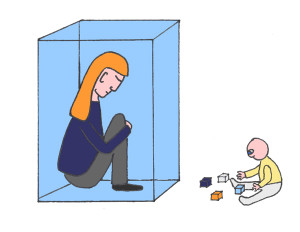There are many misconceptions about postnatal depression. The attached video shows, in my view, clearly and simply, how many mothers that I’ve seen, feel about it. The women in the clip are not patients of mine, but the clip from Channel 4 shows convincingly how they feel.
Postnatal depression affects every sixth mother during the child’s first year. In fact, it may as well occur during pregnancy and may also afflict a baby’s father. The mother feels listless, anxious and is afraid of her new role as a mother of an infant. Her self- esteem is low and her guilt feelings are painful. She is also concerned that the child might be affected negatively because of her mental state. She may seek professional help but often does not want to be regarded as a “psychiatric patient”. In other words, she feels “trapped” in a cage: she cannot get rid of her own worries and cannot get in contact with the child in a way that she has been longing for.

If the mother becomes overcomes her hesitations and seeks help, we can treat her and the child in psychotherapy. It may have positive effects on how the mother is feeling, and how she interacts with the baby – in other words how the child is feeling, too.
On the pages “The family triangle – The mother’s ghosts” and “Psychoanalyst at the Child Health Centre: treatment & research” you’ll find examples of difficulties the mother might have with, for instance, her relationship to her own mother. However, we therapists who work with babies would also like to help the baby to handle her or his “ghosts”. The next page explains what this implies.
